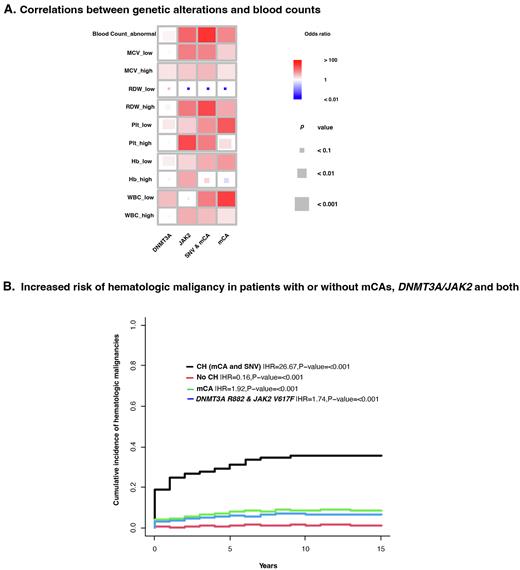Abstract
Background: Clonal hematopoiesis (CH) is an age-related expansion of mutated hematopoietic stem cells. Multiple studies have previously described distinct types of CH, CHIP (mutations in genes commonly associated with myeloid malignancies) as well as mosaic chromosomal alterations (mCA), that have been associated with increased risk of hematologic malignancies and cardiovascular morbidity. We hypothesized that the presence of both mCA and CHIP mutations may have an additive impact vis-à-vis risk of hematologic malignancy.
Methods: Data on 91,335 patients from the BioVU repository, a Vanderbilt University Medical Center biobank with linked de-identified EHRs, spanning 2006 to 2021 were included in the analysis. Peripheral blood-derived DNA of 91,335 subjects from BioVU were genotyped on the Illumina Multi-Ethnic Global Array (MEGAEX) platform, which contains more than 2 million SNPs. CHIP mutation calls (DNMT3A R882/JAK2 V617F) were made by deconvoluting the MEGAEX array intensity data. Predetermined array intensity scores greater than a defined threshold for DNMT3A R882 and JAK2 V617F mutations were highly predictive of the corresponding mutation, so these mutations were included in the analysis. Individuals with a diagnosis of hematologic malignancy (HM) prior to blood draw were excluded, while those that went on to develop HM post-blood draw were included in the analyses. The relationship between independent variables and disease progression and death was assessed using Cox proportional hazards model. All statistical analyses were performed using R.
Results: In this large cohort (n=91,335), CH is strongly age-related with an increased frequency in the elderly, as has been previously shown (eg., Bick et al, Nature 2021; Jaiswal et al NEJM 2014). In total, we identified mCA in 765 (0.8%) patients. DNMT3A R882 and JAK2 V617F SNV/indels were identified in 1167 (1.3%) and 347 (0.4%) patients, respectively. Most frequent mCA detected in this cohort include 9p CN-LOH (n=105, 6.9%), del (5q) (n=99, 6.5%), del (20q) (n=98, 6.4%), del (7q) (n=94, 6.2%), and del (13q) (n=67, 4.4%). Combined mCA and DNMT3A R882/JAK2 V617F mutations were reported in 147 (0.2%). Co-occurring JAK2 and 9p CN-LOH (n= 100, OR=5658, q<0.001) are consistent with the well-known mechanisms of biallelic alterations involved in the pathogenesis of HM. There were significant correlations between abnormal blood counts and CH lesions, for example, high platelet count had a higher frequency of JAK2 V617F and 9p CN-LOH (OR=2.57, q=3.41e-141). Individuals with mCA are associated with lower WBC and platelet count, and any blood count abnormality (Figure 1A). Finally, we looked at how presence of both mCA and JAK2/DNMT3A impact the risk of HM. In total, 1615 cases in the entire BioVU cohort were reported to develop HM: 947 myeloid, AML (n=210), CML (n=73), MDS (n=315), MPN (n=349) and 668 lymphoid, ALL (n=72), B-NHL (n=252), T-NHL (n=22), MM (n=322). The presence of mCA was associated with a higher incidence of HM (hazard ratio (HR) = 6.85, 95% confidence interval (CI) = 5.9-7.95, P < 0.001), and DNMT3A/JAK2 was associated with higher incidence of HM ( HR=5.7, 95% CI= 4.75-6.85, P<0.001), and presence of both (mCA and DNMT3A/JAK2) were significantly associated with higher incidence of HM (HR=26.67, 95% CI= 19.48-36.5, P<0.001) than observed in no CH patients (Figure 1B).
Conclusion: In this large cohort of patients, the presence of CH (both mCA and DNMT3A/JAK2) in apparently healthy individuals positively correlated with blood count abnormalities and increased incidence of hematologic malignancy. The results from this large cohort of patients emphasize the significance of detecting both mCA and SNV/indels in clonal hematopoiesis. These results should be validated in large datasets to determine if detecting both mCAs and CH can augment clinical care and outcomes.
Disclosures
Kishtagari:CTI Biopharm: Speakers Bureau. Ferrell:Incyte: Research Funding. Savona:Taiho Pharmaceutical: Consultancy; AbbVie: Consultancy, Other: travel expenses; Astex Pharmaceuticals: Research Funding; Incyte Corporation: Research Funding; Takeda: Consultancy; Sierra Oncology: Consultancy, Other: travel expenses; TG Therapeutics: Consultancy, Other: Travel expenses, Research Funding; Forma: Consultancy; Ryvu Therapeutics: Consultancy, Current equity holder in publicly-traded company, Membership on an entity's Board of Directors or advisory committees; Geron: Consultancy; Novartis: Consultancy; ALX Oncology: Research Funding; Bristol Myers Squibb: Consultancy, Membership on an entity's Board of Directors or advisory committees, Other: travel expenses; Karyopharm Therapeutics: Current equity holder in publicly-traded company, Membership on an entity's Board of Directors or advisory committees. Bick:TenSixteen Bio: Current holder of stock options in a privately-held company, Membership on an entity's Board of Directors or advisory committees.
Author notes
Asterisk with author names denotes non-ASH members.


This feature is available to Subscribers Only
Sign In or Create an Account Close Modal